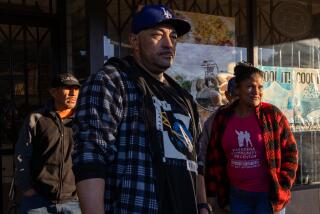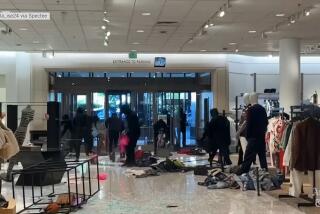7 Plead Guilty in Sweatshop Slavery Case
Marking the climax of a slavery scandal that sparked international outrage, seven sweatshop operators who recruited scores of seamstresses from Thailand and kept them imprisoned in a clandestine El Monte garment factory ringed with razor wire pleaded guilty Friday to violating federal civil rights laws.
The shocking case--which made headlines worldwide when state, federal and local officers swooped down on the San Gabriel Valley compound last Aug. 2 and liberated 72 Thai workers--will result in jail terms of up to seven years, authorities said.
The discovery of the El Monte operation also exposed the underside of the Southern California garment industry, the nation’s largest, and demonstrated how sweatshop-produced, made-in-U.S.A. clothing ends up on the racks of some of the nation’s leading retail chains. Garments produced at the El Monte site were traced to Mervyn’s, Macy’s, Filene’s and other major retailers, authorities said.
In the atmosphere of outrage after the sweatshop’s discovery, federal and state officials vowed broad reforms targeting contractors, manufacturers and retailers who profit from sweatshop labor. But independent industry monitors say sweatshop conditions and sub-minimum-wage pay are still commonplace in the garment industry, even if cases like El Monte’s are unusual.
The workers--67 women and 5 men, all now living in the Los Angeles area and employed in legal, near-minimum-wage garment industry jobs--are still awaiting the outcome of federal and state claims seeking more than $5 million in back wages from their former employers.
Among those entering guilty pleas Friday were Suni Manasurangkun, the Thai grandmother known as “Auntie” by the workers, who presided over the shop’s day-to-day operations, officials said. Manasurangkun, 66, who showed little emotion as her plea was entered in U.S. District Court in Los Angeles on Friday, operated the shop with help from her five sons, three of whom also entered guilty pleas. The other two sons are fugitives and are believed to be in Thailand, where Thai authorities are assisting in a search for them.
“This case is a sobering reminder that vulnerable people can be subjected to conditions most Americans prefer to think could not exist in this country,” said U.S. Atty. Nora M. Manella, who noted that the negotiated sentences are among the longest ever agreed to in a modern slavery case--and nearly twice as severe as provided for under federal sentencing guidelines. “The very fact that slavery could exist in this country today is appalling.”
Under terms of the plea, Manasurangkun, who pleaded guilty to charges of conspiracy, indentured servitude and harboring illegal immigrants, will receive seven years. Her sons--Wirachi, Surachai and Phanasak Manasurangkun)--agreed to six-year terms, as did Sunthon Rawangchaison, a hired guard at the site. A female manager, Rampha Satthaprasit, faces four years and a second guard, Seri Kanchakphairi, agreed to a two-year term. An eighth accomplice, Suporn Verayutwilai, a former manager who was cooperating with authorities, pleaded guilty to conspiracy last week; she faces up to five years in federal prison. All are Thai nationals.
As part of the plea, said Assistant U.S. Atty. Michael J. Gennaco, federal prosecutors agreed to drop kidnapping charges, which could have landed the defendants in prison for life.
The convictions amount to a measure of vindication for U.S. authorities, who were subjected to withering criticism last year when it became known that an initial Immigration and Naturalization Service investigation into the El Monte site was dropped in 1992 after prosecutors judged that there was insufficient evidence to secure a warrant. The U.S. attorney’s office was again hesitant to seek a warrant last summer after new proof emerged, and the raid that broke the case last August was actually undertaken by the California labor commissioner’s office.
As part of the plea agreements, Manasurangkun and her sons acknowledged running their El Monte garment business from 1989 until 1995 with a captive work force consisting largely of impoverished women recruited in Thailand.
As the operation grew, documents show, the sweatshop operators imposed increasingly harsh conditions, particularly after several escape attempts, some of which were successful. The operators eventually surrounded the compound--a converted apartment complex--with razor wire and spiked fencing, barricaded the doors and windows of the workers’ quarters, and hired the two full-time guards. The overseers censored workers’ mail and monitored their telephone calls, officials said.
The 72 Thai workers, who were illegal immigrants at the time of their arrests, have been granted one-year extensions of their work permits by the INS, said Julie Su, an attorney with the Asian Pacific American Legal Center who has been assisting them. She described them as “relieved” that their former employers were facing prison sentences.
“It was good for them to see the perpetrators of this heinous crime assume their guilt,” Su said.
Nine of the ex-employees showed up in the courtroom and bowed in gratitude to the prosecutors who handled the case.
Some would like to stay in the United States, and advocates are hopeful that federal authorities will permit that.
“They should be allowed to stay as long as they want,” said Su, who noted that the workers’ claims for back pay are pending. “They were willing to risk their lives to help out as witnesses in the trial.”
Most of the workers are originally from rural areas but had migrated to Bangkok, the Thai capital, where they were recruited by the ringleaders of the El Monte operation.
The garment workers were provided with false passports enabling them to enter the United States as tourists, met at Los Angeles International Airport and taken directly to El Monte, authorities said. Once the workers arrived at the factory, officials charged, the sweatshop operators seized their passports and took back the “show money” that had been provided to them as a cover should U.S. immigration officials question their planned tourist itineraries.
Authorities said the employees were held in what is called “debt peonage,” in which they were supposedly paying off thousands of dollars in travel and other expenses provided up front by the sweatshop operators. But in this case, the pay provided was so low that the workers could never realistically expect to pay off the debts. The guilty pleas were entered before U.S. District Judge Audrey B. Collins, who is to impose sentences at hearings beginning in late April.
More to Read
Inside the business of entertainment
The Wide Shot brings you news, analysis and insights on everything from streaming wars to production — and what it all means for the future.
You may occasionally receive promotional content from the Los Angeles Times.










